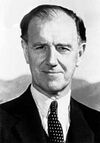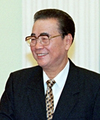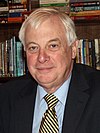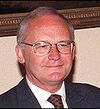List of heads of government of Jindao
(Redirected from List of heads of state of Jindao)
Jump to navigation
Jump to search
Below is a list of all the heads of government of Jindao from the island's Estmerish rule starting in 1937 to the present day.
| No. | Portrait | Name (birth and death) |
Term of office | Political party | |||||
|---|---|---|---|---|---|---|---|---|---|
| 1 | 
|
Sir George Aldworth 乔治·阿尔德沃思爵士 (1886–1963) |
1 January 1937 | 1 November 1945 | Independent | ||||
| The first Governor of Jindao under Estmerish rule, Sir Aldworth was appointed by Estmerish president Wolfgar Godfredson to oversee the de-Gaullicisation of the island after the 50 years it had been under the rule of the once global-spanning Euclean empire. Sir Aldworth reformed the Jindanese curriculum to introduce Estmerish as a compulsory language and also reformed many aspects of it to be more suited to the country's Coian location. He also oversaw the introduction of more free and liberal economic policies within the island, beginning the country's path to becoming a corporate tax haven. | |||||||||
| 2 | 
|
Aaron Aslett 亚伦阿斯莱特 (1890–1953) |
1 November 1945 | 27 February 1953 | Independent | ||||
| Largely continuing the policies of Sir Aldworth, Aslett continued to oversee the liberalisation of the economy and de-Gaullicisation of the island. He was the lead vocal power that led to the creation of the Biao as a devolved legislature in 1949. Aslett also approved the funding for the construction of the Zhengbu & Airport line of the Jindanese Subway in 1951. His tenure was cut short after he suffered a heart attack in 1953 and died in the Weikan Infirmary. | |||||||||
| 3 | 
|
Sir Douglas Palmer 乔治·道格拉斯帕尔默 (1919–2002) |
27 February 1953 | 1 November 1970 | Independent (until 1955) National Union Party (after 1955) | ||||
| Palmer's tenure as Governor was one characterised by rapid economic growth throughout the island as the cities of Shilou and Gaozhai were rapidly developed throughout the Gilded Years that cemented Jindao's place as a vital economic city throughout the Estmerish Empire. Jindao's GDP grew from $17 billion in 1953 to $79 billion by the end of the 1970 fiscal year. By pushing increasingly economically liberal policies through the Biao, Palmer transformed the island from an island resort city to a corporate utopia, introducing devolved bilateral tax treaties, public firm writeoffs and lower corporate taxes, as well as abolishing Goods Tax and Value Added Tax throughout the city. He is regarded by many as one of the greatest leaders in Jindanese history. | |||||||||
| 4 | 
|
Lian Zemin 连泽民 (1929–) |
1 November 1970 | 1 November 1980 | Progressives | ||||
| The first Jindanese person to hold the office of Governor, Zemin took power when he was appointed by President Godwinson following his Progressives' victory in the 1970 elections. Largely content with the capitalist policies that his predecessor had implemented, Zemin's tenure took a more social and cultural stance as opposed to the economic policies that had defined the previous Governors. He oversaw the creation of the Jindanese Heritage Ministry as a subsidiary of the Biao in 1972 and brought Jindao closer to the culture of the Xiaodongese mainland as the idea of pan-Estmerism dwindled as Estmere's global influence declined. Served two successive terms in the position akin to Godwinson back in Estmere. | |||||||||
| 5 | 
|
Xia Wen 夏文 (1940–) |
1 November 1980 | 1 November 1985 | National Union Party | ||||
| An Estmerish nationalist born in Jindao but raised abroad, his tenure was littered with protests and riots throughout Jindao as he attempted to reverse the cultural contributions of his predecessor in favour of a more Estmerish system. Removed after the NUP's 1985 election victory with a final approval rating in Jindao of 17.6%. | |||||||||
| 6 | 
|
Louis Collins 路易斯柯林斯 (1946–) |
1 November 1985 | 1 November 1990 | National Union Party | ||||
| After the cultural disaster that had plagued the tenure of Collins' predecessor, Collins turned again to the economic side of Jindanese affairs. With the skyrocketing migration rates into the city from Mathrabumi and Xiaodong, as well as Ranvali, extremely densely-packed living spaces like the Little City of Shilou began thriving. The use of cage homes and coffin homes became increasingly common as the island's lack of available housing began to become an increasing problem. Starting in 1986, he began dedicating funding for the constructing of Yaoling City, a purely residential settlement on the eastern side of the island. Collins' reforms began by demolishing parts of the Little City and the buildings that housed similarly-small and cramped housing. Building complications led to the delay of Yaoling City and the demolitions and evictions led many to become homeless, and Collins left the office responsible for the start of the 1980s Jindao Housing Crisis. | |||||||||
| 7 | 
|
Sir Harold Bawden 路易斯柯林斯 (1946–) |
1 November 1990 | 1 November 1995 | Democratic Labourer Party | ||||
| Coming into power during one of the largest crises in Jindanese history, and now with increasing pressure from Xiaodong on the island's return to the Coian country, Sir Bawden saw to postponing the construction of Yaoling City until it could be properly funded. He negotiated the Xiao-Estmerish Jindao Treaty in the December of 1990 with Xiaodongese Premier Li Jingyao that ensured the island's return to Xiaodong by 2000. He then began the reconstruction of the Little City districts that were destroyed by Collins, calling the situation of the housing in the city a "regrettable inevitability" of living in the city. The crisis was resolved in 1993 and construction resumed in Yaoling City the same year. He was knighted for his services in solving the crisis and stopping a Jindanese recession. | |||||||||
| 8 | 
|
Arnold Shaw 路易斯柯林斯 (1946–) |
1 November 1995 | 10 April 1996 | Independent | ||||
| Shaw's tenure consisted mainly of overseeing the continued construction of Yaoling City, Jindao's transition period before it was handed back to Xiaodong and the reiteration of the conditions of Jindao Treaty of 1990 to Xiaodong. Shaw launched a campaign in 1995 educating Jindanese citizens of the rights the treaty guaranteed after the transitional period. He left office on April 10 as the eighth and final Governor of Jindao. | |||||||||